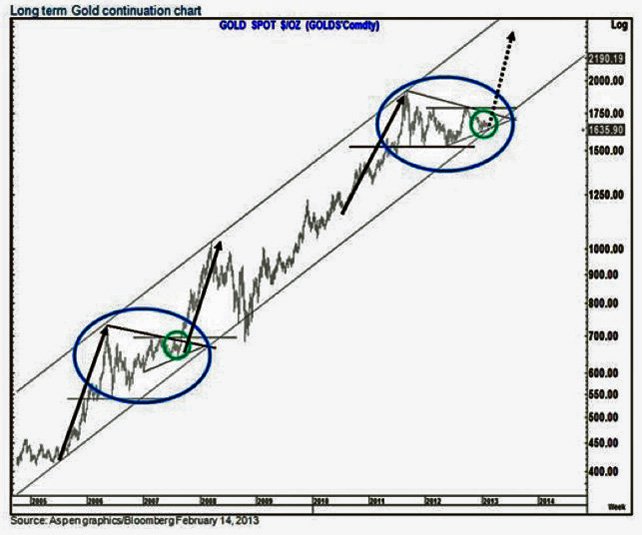“The collapse of the USSR in 1991 was seen as the triumph of capitalism over communism. The 40-year cold war was over and the West had won. That perception, however, was as premature as it was misleading. The struggle of world powers wasn’t over. Today, the struggle continues in a far more fundamental venue; on capitalism’s home court in the arena of paper money.
The West, as Mao Tse-Tung once claimed, is not a paper tiger; unless, of course, you’re referring to its paper money.
In 1991, communism was, in fact, collapsing. But capitalism, unbeknownst to itself and others, was bankrupt after its costly decades-long struggle with communism. Today, the former communist super-powers, Russia and China, have re-emerged and are playing the high-hand of gold against England, the US and the West and their now vulnerable paper currencies.
England’s debt-based paper banknotes were the reason for the West’s three hundred year global hegemony. Because of its ability to wage war on credit and pass off its debt-based paper banknotes as money, England in the 18th and 19th centuries and, later, the US in the 20th achieved a level of world power not seen since the Roman Empire.
In the 1900s, Russia and China escaped the West’s capitalist dominion by adopting communism, an alternate economic paradigm, based on the theories of Karl Marx, Friedrich Engels and Vladimir Lenin. Communism was, in fact, a potent and dysfunctional amalgam of untested theories, unfounded hopes and totalitarian state oppression.
Ostensibly offering a more equitable distribution of wealth than the banker’s paradigm of credit and debt, Marxism/Leninism was, in fact, a bloody and costly trap into which Russia and China would both fall in their attempts to escape the West’s economic and political domination.
The West’s attempts to subjugate Russia and China would, however, ultimately cost the West its foundation of economic and political power, i.e. the ability to pass off debt-based paper banknotes as money.
In capitalist economies, debt-based paper money possessed intrinsic value because it was convertible to gold upon demand. Gold, in fact, was capitalism’s ‘secret sauce’, the essential ingredient that transformed the bankers’ debt-based banknotes into something other than government-issued IOUs.
Since 1971, however, the West’s paper banknotes are no longer convertible to gold. This is because after WWII, the US, in its attempts to militarily subjugate Russia and China overspent its massive gold reserves, forcing it to end the gold-convertibility of the US dollar. As a result, all currencies in the world formerly tied to the US dollar and hence to gold became fiat, i.e. currencies who have value only because of government fiat, i.e. command.
After 1971, it was only a matter of time until the bankers’ debt-based paper banknotes—without the convertibility to gold—would become increasingly unstable and ultimately worthless; and, today, in 2013, the former has happened and the latter is underway.
The value of today’s paper money is determined solely by currency speculators placing leveraged bets in the hopes of achieving short-term gains. Once the gold-convertibility of paper money ended, modern currencies became paper coupons with expiration dates written in invisible ink.
Today, the West and its bankers are desperately hoping that no one will notice, hoping thereby to prevent a hyperinflationary collapse of paper money should confidence in fiat paper money evaporate.
Russia and China, however, are preparing for that very day. Russia and China are stockpiling gold as fast as they can in anticipation of a coming currency crisis triggered by the West’s increasingly suspect paper money.
For the former communist powers, Russia and China, it’s payback time; but for England and the US, it’s blowback time

Blowback, an unforeseen and unwanted effect, result, or set of repercussions
Merriam-Webster dictionary
THE EAST IS GOLD WITH A RED TINGE
On February 6, 2013, in China Gold Imports from Hong Kong Climb to record on Wealth, Bloomberg New reported:
Exports of gold to Hong Kong from China more than tripled to 310,861 kilograms in 2012 from about 95,529 kilograms a year earlier, according to Bloomberg calculations. Shipments were 29,718 kilograms in December, up from 28,978 kilograms in November.

In the article, Bloomberg News also noted the growing relationship between China’s wealth and the ownership of gold:
China’s urban per capita disposable income rose 12.6 percent in nominal terms in 2012 to 24,565 yuan, the National Bureau of Statistics said on Jan. 18. Per capital rural net income increased 13.5 percent in nominal terms, and 10.7 percent in real terms…

Not only is China buying record amounts of gold, Russia is buying even more. On February 11th in Putin Turns Black Gold Into Bullion as Russia Outbuys World, Bloomberg News reported that Russia’s President Putin is investing Russian’s oil income in gold bullion at a record rate:…”
Full article
Comments »





